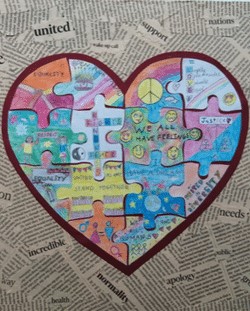Wellbeing
We believe that Wellbeing education enables children to become healthier, more independent and more responsible members of society. We encourage our pupils to play a positive role in contributing to the life of the school and the wider community. In doing so, we help to develop their sense of self-worth. We ensure that the children experience the process of democracy through participation in a range of activities, including the School Council. We teach children about their rights and about their responsibilities. They learn to appreciate what it means to be a positive member of a diverse and multi-cultural society. Indeed, the teaching of Wellbeing helps in many ways to meet the objectives set out in the Children’s Act 2004 (Every Child Matters) – ‘that to be healthy, stay safe, enjoy and achieve, make a positive contribution, and achieve economic well-being’.
Our objectives in the teaching of Wellbeing are for all our children:
- To understand what makes a good relationship with others;
- To have respect for others
- To develop self -confidence and self-esteem;
- To know and understand what is meant by a healthy lifestyle;
- To understand the importance of looking after their mental health;
- To prepare pupils for puberty, give them an understanding of sexual development and the importance of hygiene;
- To be thoughtful and responsible members of their community and their school;
- To prepare pupils to be positive and active members of a democratic society
- To allow pupils to acknowledge and appreciate difference and diversity in their communities
- To be aware of safety issues, including those they may face online;
- To make informed choices regarding personal and social issues;
This Wellbeing Curriculum also incorporates all statutory aspects of Relationships Education, Relationships and Sex Education (RSE) and Health Education as introduced from September 2020. At Keston we teach the Relationships and sex education (RSE) expectations from Year 1 to Year 6, through our weekly PSHE sessions. Our medium term plans were shared during a consultation with parents. The Wellbeing Policy can be found in our Policies section.
As of September 2020, Relationships and Health Education is compulsory for all children of primary school age. The Wellbeing curriculum was developed in response to the statutory guidance from the Department for Education regarding ‘Relationships Education, Relationships and Sex Education (RSE) and Health’.
It involves four key areas of Relationships, Health, Citizenship and Safeguarding which are then broken down into smaller topics as follows:

Relationships
- Families and People Who Care for me
- Caring Friendships
- Respectful Relationships
Health
- Physical Wellbeing
- Healthy Eating
- Drugs, Alcohol, Tobacco
- Health and Prevention
- First Aid
- Changing Bodies
- Mental Wellbeing
Citizenship
- Diversity and Equality
- Respect Diversity and Equality
- How to be a productive member of a diverse community
- Environment
- Respecting and Protecting the Environment
- Economics
- Managing Money Effectively
- The Part Money Plays in People Lives
- Understanding of Enterprise
Safeguarding
- Keeping Safe
- Managing Risk and Decision Making
- Extremism and Radicalisation
- Internet Safety
- Online Relationships
